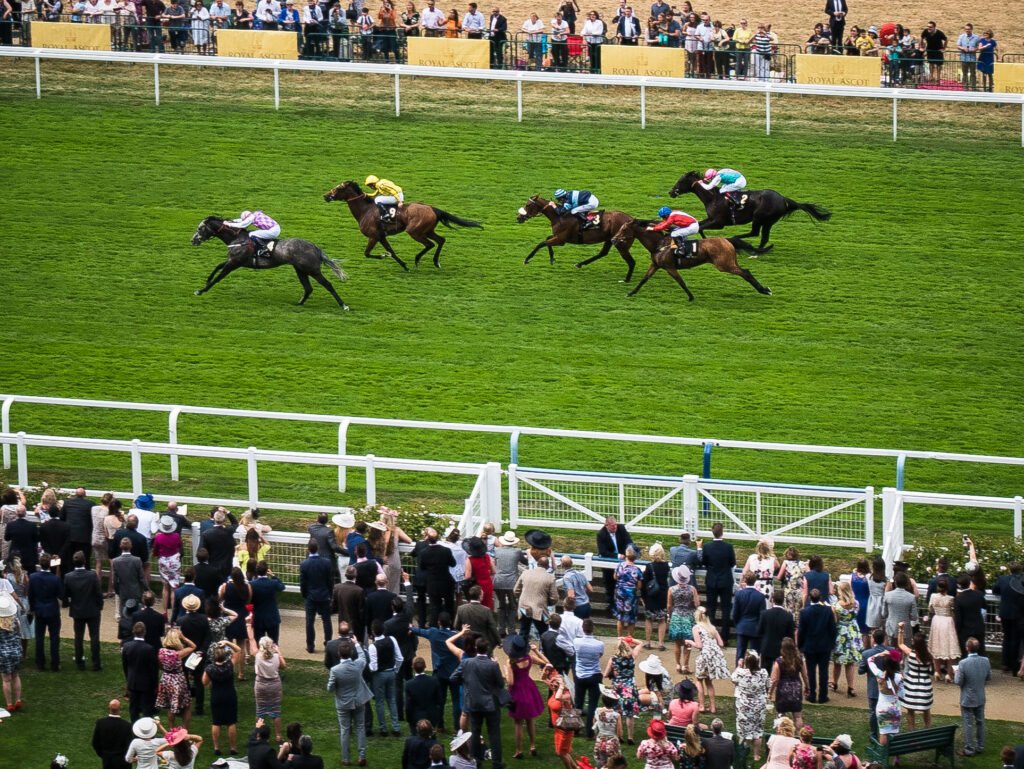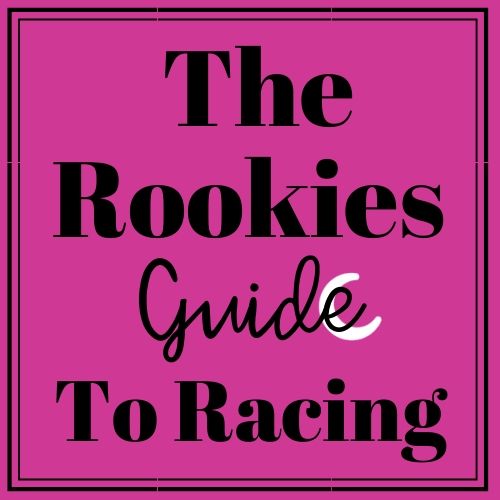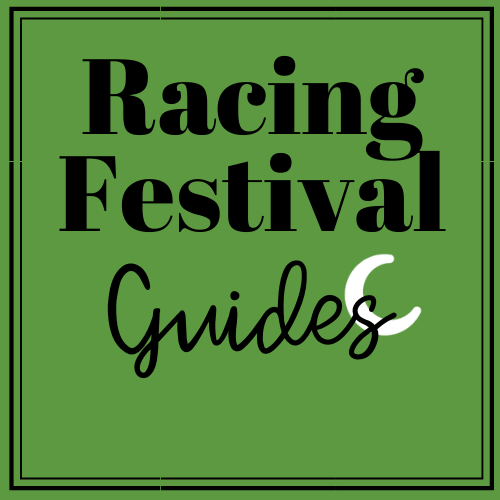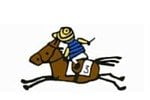“Royal Ascot” (CC BY-SA 2.0) by Dumphasizer
In 2009 Yeats was set to attempt a historic fourth victory in the Ascot Gold Cup.
Ahead of the event, Lee-Ann Day-Whistler from www.famousracehorses.co.uk wrote about Yeats, setting the scene for the fourth attempt and her hopes for the horse’s success once more:
Royal Ascot is graced by many men and women who would not look out of place on a best dressed list and the judges for Best Turned Out in each race will be hard pressed to chose from the horses on show as they all put their very best hoof forward. But most would agree that the best looking one of all at the meeting will appear on Thursday, as he has for the last three seasons, in the Ascot Gold Cup.
Yeats even has his own group on Facebook which proclaims him as’ the handsomest horse in training’. You could probably add, ‘or anywhere’.
The Ascot Gold Cup is the longest Group One race in the world. Its two and a half miles separates the men from the boys and many favourites have failed to do the distance in the illustrious history of the race.
Once upon a time it was expected that Derby winners put their stamina to the test and went to Ascot and the list of Classic winners who won the Ascot Gold Cup is impressive. Ocean Swell in 1945 is the last horse to complete the Derby/Gold Cup double; Gladiateur and Isinglass did it in the 19th century and the first winner of the Triple Crown, West Australian, won in 1854.
But sadly Derby winning horses taking part is in the distant past. In recent years there has been much talk of reducing the distance of the race. Fans of staying races and stayers did not want it reduced, and horses such as Persian Punch, Kayf Tara and Double Trigger raised the profile of the race. Persian Punch never won the race, but placed in it twice; talk was that had he finally won his Group 1 race there at Ascot it would not have been only the profile of the race he raised, but the roof of the stand as well. And then there was Yeats.
Tall dark and handsome, impeccably bred and with that aristocratic temperament. He’s a horse with a past, a presence and a future, guaranteed a retirement to stud duty at Coolmore. Fans turn up just to see him in the flesh, win or lose. Who could compare with all of that?
Yeats was so nearly a Classic winner himself and is as close as we are likely in modern times to see a horse triumph at Epsom and in the Ascot Gold Cup. In 2004 he started odds of 1/5 when Jamie Spencer rode him to victory in the Derrinstown Stud Derby Trial. Many other Derby winners have triumphed there and gone on the further glory at Epsom. No surprise that Yeats was then 5/2 to win at Epsom, but sadly injury meant he was off for the rest of the season.
Indeed, while it is almost unheard of for Derby aspirants to compete in the Gold Cup in the modern era, for much of the race’s history it became the primary objective after Epsom glory. His owners were patient and Master trainer Aidan O’Brien nursed Yeats back to health.
The following year he went to Epsom for the Coronation Cup and won as if to prove that he could have won the Derby the year before. In 2006 he and Kieren Fallon stunned racegoers on Ladies’ Day with a combination of good looks and imperious performance. Yeats let it be known that he was ‘mad, bad and dangerous to know’ as he flicked his tail in impatience and drew past the French favourite, the grey Reefscape. Yeats had done it. Won at the highest level over a mile and a half and then stepped up a mile more and done the same.
Once seen, Yeats was not a horse that you would ever forget. A few of us marked our cards on that day and wondered whether this horse would be back to match the record of another French trained, Sagaro who had taken three Ascot Gold Cups. We thought he would and even bid on Ebay for a racecard from the day that Sagaro got his third victory. We secured it with a winning bid and were back at Ascot the following year.
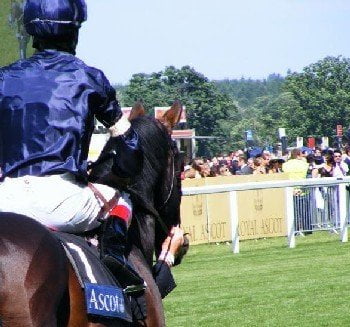
Down to the start in 2008
Yeats had a new partner in Mick Kinane in 2007 and in 2008 he and Johnny Murtagh completed the hat-trick without any fuss when they again faced a French trained favourite in Coastal Path. It was the admirable Geordieland who chased Yeats home only to be beaten by five lengths after coming second to him in 2007 by a length and a half. Such has been the superiority of Yeats that even his runner-up has a fan following.

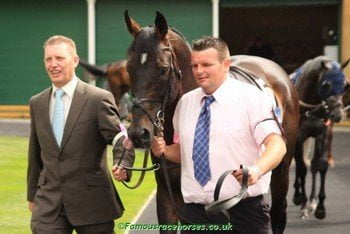
The first horse to win two Ascot Gold Cups was named Bizarre, in 1824 and 1825. Well known horses to do so in current times include Le Moss, Ardross and Kayf Tara. Only Sagaro and Yeats have won three. Sagaro won his between 1975 and 1977 and has a race for stayers named after him at Ascot which is a triail for the Gold Cup.
On Thursday Yeats will go to battle again, this time a year older, an eight-year-old entire, wiser and with more experience than anything else in the race. He may still want to fight or he may not. If he does and he succeeds he will become the first horse in history to win four Ascot Gold Cups. A feat unlikely to be seen again in our racing lives.
Yeats has had only one start this season, at Navan in a race he has won before, where he appeared lacklustre and worried some of his fans, but not all them. He reportedly blew hard after the race and will be expected to be in much better shape when he lines up at Ascot.
The question everyone will be asking is can this eight-year-old warrior rise to the occasion one more time. No eight-year-old has won this race since Merman 1900, but Yeats is no ordinary horse. Although he will once more meet his old adversary Geordieland, runner-up on both previous occasions, who has beaten another of his competitors Patkai, fans of Yeats expect them all to take a back seat should Yeats turn up ready for battle once more.

We went to Ballydoyle to visit him last year and were honoured to meet him in the flesh. But a word of warning – when Yeats is on form he is a most formidable beast. You have to keep your distance because while you admire his outstanding good looks he does his best to bite you!
He has equalled the mighty Sagaro’s record of three consecutive victories in the race, won six Group 1s including a Coronation Cup, an Irish St Leger and a Prix Royal-Oak, and 14 of his 23 career starts to date.
We will be there to cheer him on in what may be his last epic battle, win or lose it will be a pleasure to see him take part and this rare racehorse leaves us with many memories.

Words: Lee-Ann Day-Whistler from www.famousracehorses.co.uk ; pictures: John Whistler
When Yeats WON the race, the roof was nearly blown off the stands by the cheers, and commentator Clare Balding declared this would be a moment in racing history where everyone would remember where they were if they were watching it at the time. She was right: many years later, we still remember, and continue to publish this article as a tribute to this magnificent horse and his achievements.
Allison is the Publisher of Eclipse Magazine. She loves going to the Races and is learning to bet (despite being officially the worst bettor in the History of the Universe), there’s a lot more to learn…


